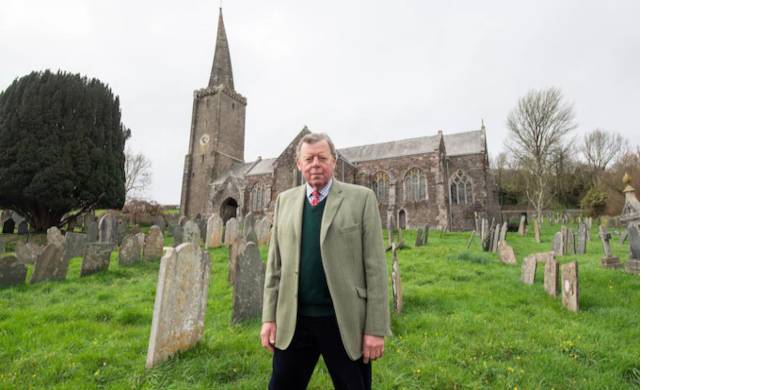Up to a quarter of Church of England parishes have no wardens
The voluntary role is responsible for a number of duties, including the maintenance of church buildings
Sir James Burnell-Nugent said churches needed more volunteers CREDIT: DALE CHERRY
By Gabriella Swerling,
Social And Religious Affairs Editor
THE TELEGRAPH
18 March 2024
Up to a quarter of Church of England parishes do not have church wardens, new figures show.
The voluntary role is responsible for a number of duties, including the maintenance of church buildings, supporting the parish priest, and administrative tasks. They are also generally responsible for the day-to-day functioning of the parish.
But a new survey of the Church's 42 dioceses has revealed the extent of the staffing crisis faced by the institution amid warnings that volunteers have been "taken for granted for too long".
Of the dioceses that replied to questions regarding recruitment challenges, 40 per cent of parishes had only one churchwarden, while between five and 21 per cent had none. Furthermore, one diocese reported that 22 per cent of its parishes were missing one or more people in key positions this January, according to the survey conducted by The Church Times.
Church parishes are declining at their fastest rate on record Average annual closures or mergers of parishes
Critics say the volunteer shortage comes as wardens face mounting workloads and bureaucracy as they struggle to support overstretched vicars who increasingly have to represent more than one congregation.
Rev Marcus Walker, the chairman of the Save the Parish campaign group, said: "The national church loves to put paperwork onto the backs of clergy and volunteers, and then turns around and acts surprised when people find other things to do."
The reverend, who is also Rector at St Bartholomew the Great in the City of London and a member of the General Synod, the Church of England's legislative body, added: "Step one to saving the Church at the local level is to stop volunteering in a Church so hard to do. Volunteers have been taken for granted for too long; now it's time to value them properly."
Last year, The Telegraph's analysis of the most recently available Church of England statistics found that between 2016 and 2021, 278 individual parishes disappeared and were either reorganised or merged as the figures dropped from 12,510 to 12,232.
Death knell
This worked out as an average of 56 fewer parishes each year, and marked the fastest rate of parish closures in 70 years, fuelling fears that the Church had been "dealt a death knell".
Vicars are increasingly having to represent multiple congregations, and travel between them, leaving the Church of England to rely more frequently on volunteers.
According to ecclesiastical law, under the Mission and Pastoral Measure 2011, parishes that do not have any churchwardens, a secretary or treasurer, "may no longer be quorate and are at risk of compliance failure".
Save the Parish campaign group claimed that these rules are all designed without reference to what happens "if everything fails" and is based on the assumption that "there will always be volunteers".
An internal review of the 2011 Measure before the General Synod, the Church's legislative body, last summer, conceded that "the Church has recognised for some time that the administrative and compliance burden for PCCs, churchwardens and volunteers has grown significantly and that at the same time in some areas the numbers of volunteers have been decreasing".
Adml Sir James Burnell-Nugent, a retired Royal Navy officer who served as Commander-in-Chief Fleet from 2005 to 2007, who now acts as a church warden at St Peter and St Paul Church, Ermington, in south Devon, said: "We need more PCC members and we need more volunteers for all the essential chores that make the church a warm and happy place to worship.
Church numbers have fallen
"We are raising money to pay for the changes necessary to get to Carbon Net Zero as demanded by the Church of England. We are managing, not least because of the competence and commitment of our Rector as well as the PCC. But it is tough when it should be fun; it is repetitive, when it should be refreshing; and it is difficult to see who will take over when there should be a waiting list."
In response, Andrew Rumsey, the Bishop of Ramsbury and joint lead bishop for church buildings, said: "Volunteers are the bedrock of our parishes and they generously devote untold hours to church activities and charitable projects, from after-school clubs to food banks.
"Much of our social fabric depends on their heroic efforts, which spring from their Christian faith and its emphasis on loving one's neighbour.
"Yet we know that a range of changes in society -- such as the need for people to keep working late in life thanks to the rising cost of living and an increase in caring responsibilities -- means that many who might like to volunteer are unable to, and this challenge in recruiting volunteers is widespread across the charity sector.
"The role of churchwarden is one of the oldest voluntary roles in existence and can certainly be demanding, especially for those who have served long.
"Across the country, churches are exploring creative ways to share the burden of office and encourage new volunteers to come forward. In many places -- especially rural communities -- the challenge is one of growing root-level co-operation across local boundaries without losing local identity."
The bishop added: "We must be dedicated in supporting wardens in their vital role and as imaginative as possible in encouraging those who will succeed them. Most of all we are thankful for those who dedicate their free time in generous Christian service of others."
END














